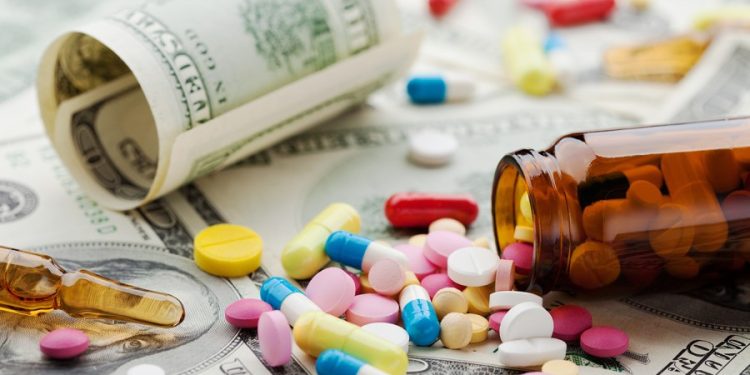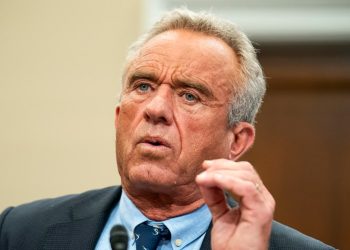The Trump administration’s threat of pharmaceutical tariffs could risk significant political backlash, as the drug industry and outside experts are raising red flags over worsening shortages and an extended fight over who will pay.
The White House disclosed earlier this month it launched an investigation into whether pharmaceutical imports threaten national security, an effort to lay the groundwork for tariffs.
The administration wants more companies to onshore their manufacturing, and health policy experts for years have raised alarm about the U.S. relying too much on ingredients from overseas, especially from China.
But the drug industry is complicated; a drug or biologic that was finished and packaged in India before being imported to the U.S. likely relied on starting material from China. It’s also common for a drug packaged and finished in the U.S. to rely on an active ingredient from overseas.
As a result, experts have said a one-size-fits-all rate like what the White House imposed on steel, aluminum and cars would be devastating.
Risks driving up costs for consumers
There’s a broad assumption that tariffs will drive up prices, though President Trump has said companies hit by tariffs should swallow the higher cost.
But in the labyrinthian U.S. health care system, a chaotic mix of regulations, stakeholders and deals will determine what consumers ultimately pay.
Marta Wosińska, senior fellow at the Brookings Institution who specializes in health care economics, said how much patients feel the impact of the tariffs will depend on whether drug companies can pass the costs on to other players in the system.
Drug prices are a political land mine, and companies are loath to raise prices given the anger among lawmakers and the public over medical costs. Trump could also face harsh political backlash if tariffs drive drug prices even higher.
“I think there’s a lot of politics involved here. This is not a time to increase drug prices,” Wosińska said, citing increased scrutiny from lawmakers.
Even putting the blame squarely on Trump “is not very good optics,” she added.
Drug companies also enter contracts with pharmacy benefit managers and group purchasing organizations, which may discourage steep price hikes, at least in the short term.
If a company were to raise the price too high, health plans and pharmacy benefit managers may restrict people from using it, because they don’t want to pay. Additionally, until current contracts are renegotiated, drug companies and health plans are locked into a reimbursement rate.
A more expensive pharmaceuticals market also could mean higher health insurance costs.
“Increasing frequency and severity of risk for insurers, inflationary pressures, and public policy, such as taxes and tariffs that raise insurers’ costs, will ultimately be passed on to policyholders,” the National Association of Insurance Commissioners said in a statement to The Hill.
Brand name drug companies, many of which are already moving manufacturing back to the U.S. — like Novartis, Eli Lilly, and Johnson & Johnson — are better suited to absorb the cost of the tariffs than makers of generics because margins on their products are so high.
But if the prices of brand-name drugs rise, the people most impacted would be those enrolled in high-deductible employer sponsored plans, which have fewer protections against drug price increases than Medicare or Medicaid.
“A 20-percentage point increase in the effective tariff rate on drugs would be something like a 2.4 percent increase in overall health insurance costs,” said Josh Bivens, chief economist at the Economic Policy Institute. “Not a total game-changer, but, given how expensive premiums already are, this is not small money.”
For example, Bivens said a $25,000 per year family plan would increase by $600 per year.
Raises fears of potential shortages
Bivens noted that Trump’s signature first-term tax law — the Tax Cuts and Jobs Act — contributed to a “huge increase” in the U.S. importing prescription drugs.
The law gave a significant incentive for pharmaceutical companies to move both their profits and production overseas. Earlier this year, Senate Democrats on the Finance Committee claimed U.S. drugmaker Pfizer took advantage of the 2017 law to carry out “potentially the largest tax-avoidance structure in the history of big pharma.”
But if these companies have to absorb the cost of tariffs, any tax advantages would be moot.
A persistent concern among advocates and stakeholders is that tariffs will price generic manufacturers out of the market. Generics make up about 90 percent of the medicines prescribed in the country, and the industry’s operating margins are razor-thin.
Some manufacturers will attempt to pass along the increased costs stemming from tariffs, but many could decide to halt production, leading to shortages.
Drug shortages already pose significant problems in the country, and they have become more frequent and disruptive in recent years.
The Association for Accessible Medicines (AAM), a trade group for generic drug companies, has been at the forefront of dire warnings about the effects of tariffs on the generic industry.
“Without substantive regulatory and reimbursement changes to the U.S. market, tariffs will exacerbate current shortages that hinder patient access today,” John Murphy III, president and CEO of the AAM, said in a statement.
“Instead, we urge the Administration to work with us on a suite of reforms that prioritize patients, national security, and ultimately will lead to more resilient and reliable access here in the U.S.”
Murphy said the group would also support exemptions and carve-outs for “essential and short-supply medicines” as well as for their base ingredients.















